Tom Toles takes on the Texas Crusaders.

Tom Toles takes on the Texas Crusaders.

From Funny or Die, President Obama is visited by past presidents trying to convince Obama to fight for the Consumer Financial Protection Agency. All-star cast and directed by Ron Howard:
A CFPA overview from the LA Times:
The core idea behind the proposal, supporters say, is to pull together consumer oversight powers that are now scattered among various agencies, and to put consumer interests where they should be much higher on the priority list than they were during the years leading up to the housing and credit bubble and bust.
Along with something else, a consumer protection agency is an area where we lag behind of other Western nations.
Hilarious:
The Washington Post “asked former politicians and others to name one idea other than reforming the much-discussed filibuster that might get Congress moving.” Several interesting ideas, including this one from Mack McLarty, Chief of staff to President Bill Clinton, 1993-94:
…abolish the anonymous hold on nominations. Beyond fixing the Senate, this would also strengthen the governance of our country by allowing the president to more expeditiously get his full team in place.
And this one from former Rhode Island Senator Warren Rudman:
To restore the public’s trust and put senators back to work, we need to end their reliance on special-interest money. The best solution I know is citizen-funded elections: a system of small donations from constituents and matching public funds for qualifying candidates who forgo large donations.
(Nod: Ezra Klein)
In Texas, history is being written by those who have the most money.
For anyone interested in or concerned with how Christian conservatives continue to wield influence on American politics or anyone interested in reading the somewhat disturbing process on how school textbooks are written (hint: it’s all about politics and money and now religion), New York Times reporter Russell Shorto’s article on recent events in Texas regarding their state social studies curriculum is a must-read.
Each year in Texas, the state board of education reviews a school subject and hears petitions on what to include in or what to remove from that subject’s curriculum. Why this is important is because of its national implications. Because of Texas’s large textbook-purchasing budget, textbook publishers cater to Texas standards. Because publishers would rather not create multiple versions of the same textbook to meet other states’ requests, Texas wins, and what Texas wants, other states get, too.
The problem is that the Texas State Board of Education is half made-up of Christian conservatives who are interested in rewriting the history books to elevate religion and their claims of religious intentions of the Founders and downplay other political entities throughout American history.
Merely weaving important religious trends and events into the narrative of American history is not what the Christian bloc on the Texas board has pushed for in revising its guidelines. Many of the points that have been incorporated into the guidelines or that have been advanced by board members and their expert advisers slant toward portraying America as having a divinely preordained mission.
There is, of course, an established separation of church and state in the Constitution, a doctrine that has been upheld by the U.S. Supreme Court. Christian advocates in Texas, however, are adamant about challenging that doctrine and are trying to paint the Founders as ardent Christian crusaders.
But how Christian were the Founders?
…the founders were rooted in Christianity they were inheritors of the entire European Christian tradition and at the same time they were steeped in an Enlightenment rationalism that was, if not opposed to religion, determined to establish separate spheres for faith and reason. “I don’t think the founders would have said they were applying Christian principles to government,” says Richard Brookhiser, the conservative columnist and author of books on Alexander Hamilton, Gouverneur Morris and George Washington. “What they said was ‘the laws of nature and nature’s God.’ They didn’t say, ‘We put our faith in Jesus Christ.’ ” Martin Marty says: “They had to invent a new, broad way. Washington, in his writings, makes scores of different references to God, but not one is biblical. He talks instead about a ‘Grand Architect,’ deliberately avoiding the Christian terms, because it had to be a religious language that was accessible to all people.”
…which makes many of the Founders deists, not Christians. Furthermore,
The curious thing is that in trying to bring God into the Constitution, the activists who say their goal is to follow the original intent of the founders are ignoring the fact that the founders explicitly avoided religious language in that document.
Yes. There is no mention of “God” in the Constitution, and the pseudo-religious mentions in the Declaration of Independence are all deist-minded: “Nature’s God,” “Creator,” and “Divine Providence.” Moses, Jesus, and the like are conspicuously and purposefully absent from both documents.
Do Christian activists in Texas merely want to bend history to their liking, or is there something else involved? Brian Spears at The Rumpus writes:
…there is still a danger in allowing the history books to be rewritten to the degree these people wish. Orwell was right when he said “who controls the past, controls the future,” only in this case, the past I’m concerned about is not in the books, but in the memories of the kids who’ll read those books. The people pushing for these changes aren’t looking for nuanced view of early America-they want a curriculum loaded with Christian Dominionism and American exceptionalism, because they’re hoping to convert people to the cause, and a good place to start is in the public schools.
I wonder how the people at Fox News might respond to political indoctrination. Still, this is definitely a fight worth watching, no matter your position on religion and politics. Both the past and the future are at stake.
(Nod: The Daily Dish)
In time for President’s Day yesterday, Nerve ranked the 43 men who’ve occupied the White House, but not by effectiveness, historical significance, or popularity. No, they ranked the presidents by sexiness. The commentary is pretty funny. Here’s what they had to say for #5 Franklin Pierce:
There’s not much to say about this obscure president, except that he’s gorgeous. He’s like Johnny Depp, but without as much to show for himself.
(Nod: @ezraklein)
A few quick reactions to President Obama’s State of the Union address tonight:
With his State of the Union address, President Obama seems to have reinvigorated himself and likely many straying supporters. Let’s see if he can keep the fire going and deliver on his calls to action. Our future is waiting. The status quo simply doesn’t work anymore.
I’m nearly finished listening to the oral arguments from the U.S. Supreme Court case Citizens United v. Federal Election Commission. In thinking over the weekend about last week’s ruling and in listening to the arguments, I have these observations:
If the political/news/blog world weren’t so wrapped up in the special election in Massachusetts, we might actually be talking about this. But we aren’t.
James Fallows at The Atlantic posted this graph and comment yesterday (click for larger version):
Notes Fallows:
The blue line, on the top, is the significant one: it is a gauge of how often bills or nominations were subjected to the need for a “supermajority” vote, rather than a regular Constitutional majority. The goldish line, on the bottom, indicates how often the supermajority prevailed — how often they “broke the filibuster.” As a reminder, there is nothing in the Constitution about this practice. (Supermajorities for certain situations, like impeachment or ratifying treaties or passing Constitutional Amendments, yes; as a general practice, no.)
Easy to see why not much gets done.
Will the many conservative politicians who in the past have lambasted state supreme courts’ decisions in support of gay marriage as “judicial activism” also condemn Thursday’s U.S. Supreme Court decision eliminating the ban on corporations’ spending limits in political campaigns as “judicial activism”?
I’m going to guess “no.”
If air travel worked like the health care system. In this context, I’m amazed that we tolerate such a disgustingly broken and inefficient system.
(Nod: The Daily Dish)
Totally random thought here. While browsing through some recent uploads to the White House Flickr account via my RSS reader, I came across this photo:
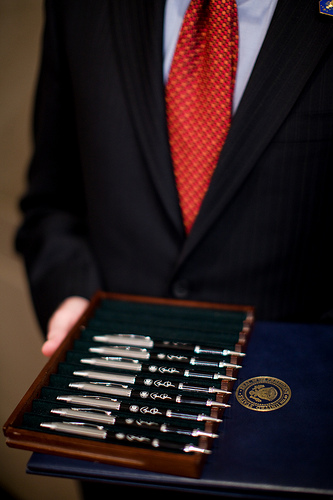
These are pens for a bill-signing. What intrigued me about this photo is the direction of the signature on each pen. Because the signature reads from the top of the pen to the bottom while the pen’s tip is pointing right, this pen is a left-handed pen. If you pick up this pen to write with your left hand, the signature is right-side up; pick this pen up with your right hand to write, and the signature is upside-down. A left-handed pen for a left-handed president? No detail overlooked or just a coincidence?
Just for the heck of it, I tried to find some presidential pens in official use by past presidents. I found President Bush’s pens here:

These are right-handed pens. If you take the cap off and stick it on the non-tip end of the pen, the signature will remain upright in your right hand but upside-down in your left hand. A right-handed pen for a right-handed president?
My guess is that the Bush pen likely used a standard direction because a majority of people are right-handed, but the Obama pen was specially made to be a left-handed pen. How’s that for an exciting Friday night?
I learned this week from the website OpenCongress a federal lawsuit was filed charging the method used to apportion seats in the U.S. House of Representatives effectively disenfranchises voters in smaller-population states. OpenCongress cites a New York Times article by Peter Baker. From the NYT:
In theory, every member of the House represents roughly the same number of people. But because each state gets at least one seat, no matter how small its population, and because the overall size of the House has not changed in a century, the number of people represented by a single congressman can vary widely.
The most populous district in America right now, according to the latest Census data, is Nevada’s 3rd District, where 960,000 people are represented in the House by just one member. All of Montana’s 958,000 people likewise have just one vote in the House. By contrast, 523,000 in Wyoming get the same voting power, as do the 527,000 in one of Rhode Island’s two districts and the 531,000 in the other.
That 400,000-person disparity between top and bottom has generated a federal court challenge that is set to be filed Thursday in Mississippi, charging that the system effectively disenfranchises people in certain states. The lawsuit asks the courts to order the House to fix the problem by increasing its size from 435 seats to at least 932, or perhaps as many as 1,761. That way, the plaintiffs argue, every state can have districts that are close to parity.
Baker cites the historical background of the current House situation:
The issue traces back to the founding of the country. The Constitution stipulated that every 10 years, the House should be reapportioned so that each state had at lease one representative and that no Congressional district contained fewer than 30,000 people. But it was left to Congress to decide how many total House seats there should be.
The original House had 65 representatives, one for every 33,000 people. As the country’s population grew over the next century, so did the size of the House, until it reached 435 in 1911, when each member at that time representing an average of 212,000 people.
But Congress refused to reapportion after the 1920 Census, as a wave of immigration threatened to shift voting power from the South and Midwest to the urban Northeast. Eventually, Congress voted to keep the House at 435 seats regardless of rising population. Except for a brief period when it enlarged to 437 because Alaska and Hawaii had joined the union with one seat each, the House has remained at 435 ever since.
This is certainly an interesting idea. Imagine your Congressperson having a more intimate knowledge of your district and your needs while being part of a more equitable system.
But the first thing I thought of when I was reading this story was not the future implications on our democracy if the House was expanded to double its current size. The first thing I thought of was where do you put all these new representatives? Surely an addition on the House or, gasp, a new building would be necessary, no? Will the House turn into the Galactic Senate from Star Wars?
A neat photo just released on the White House’s Flickr photostream:

From the description:
Seated from left: Defense Secretary Robert M. Gates, Treasury Secretary Timothy F. Geithner, Secretary of State Hillary Rodham Clinton and Attorney General Eric H. Holder, Jr.
Standing second row, from left: Agriculture Secretary Tom Vilsack, Energy Secretary Steven Chu, Homeland Security Secretary Janet Napolitano, White House Chief of Staff Rahm Emanuel, Health and Human Services Secretary Kathleen Sebelius, U.S. Trade Representative Ron Kirk, U.S. Permanent Representative to the United Nations Susan E. Rice, Veterans Affairs Secretary Eric K. Shinseki, and Education Secretary Arne Duncan.
Back row, from left: Transportation Secretary Ray LaHood, Environmental Protection Agency Administrator Lisa P. Jackson, Commerce Secretary Gary Locke, Labor Secretary Hilda L. Solis, Interior Secretary Ken Salazar, Housing and Urban Development Secretary Shaun Donovan, Office of Management and Budget Director Peter Orszag, and Council of Economic Advisers Chair Christina Romer. (Official White House Photo by Chuck Kennedy)
Ugh. More questionable news from the world of electronic voting machines. Kim Zetter at Wired is reporting Premier Election Solutions, Diebold’s voting machine division, is being sold to a competitor, Election Systems & Software (ES&S), but the sale may run into some trouble:
The sale gives ES&S, already the largest voting machine maker in the country, a near monopoly on the voting machine industry. According to the company’s website, its systems, used in 43 states, counted “approximately 50 percent of the votes in the last four major U.S. elections.”
Hart InterCivic, a voting machine firm based in Texas, filed an antitrust suit (.pdf) on Friday, seeking a temporary and permanent injunction against the sale. According to the suit, the sale “poses a significant and imminent threat of irreparable antitrust injury to plaintiffs.”
The sale also threatens harm to election districts that purchase voting equipment in that it will likely increase the costs of equipment and result in a decrease in the quality of products, the suit alleges. It will also, ultimately, cause “harm to the voters of the United States, in the form of loss of confidence in the integrity and security of the means by which elections are performed.”
Hah. “Loss of confidence in the integrity and security” of the voting system in this country? I already had no confidence. Zetter continues:
The suit alleges that Diebold and ES&S have long engaged in anti-competitive practices to win bids “through both legitimate and illegitimate acts and conduct.”
This behavior includes submitting low-ball bids to get contracts, after which the companies allegedly gouge customers with additional expenses for after-market service and upgrades. The suit alleges the companies also exaggerate the capabilities of their systems, misrepresent the status of their certification and exert improper and undue influence on government officials to win contracts.
The suit identifies ES&S as serving 45 percent of the country’s approximately 180,000 voting precincts. Premier serves approximately 23 percent; Sequoia Voting Systems serves 18 percent; Hart InterCivi serves 9 percent; and Dominion Voting Systems serves 5 percent.
Because of the anti-trust concerns, Senator Charles Schumer has asked the Justice Department to look into the sale. Wired reports Sen. Schumer saying
the deal raises anti-competitiveness concerns and has “adverse implications on how our country votes.”
I hope Sen. Schumer doesn’t stop at asking the Justice Department to investigate this sale of Premier. This is a start, but please, senator, let’s investigate the entire electronic-voting-machine industry and force them to adopt rigorous integrity and security standards. Is it too much to ask that we ensure our voting system actually works?
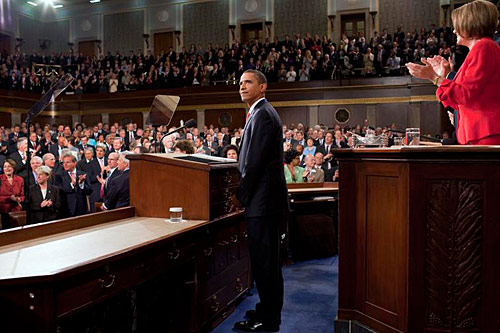
I went into President Obama’s Wednesday night national address with very high expectations. After watching the White House essentially sit back and watch the health care debate run away from them, I anticipated an effort by the president to start changing the debate. What I watched Wednesday night was exactly what I expected and was hoping for.
Obama’s address was both decisively strong and aggressively determined. I wrote last month about the differences between Candidate Obama, who seemed to always have the appropriate response at the appropriate time while his opponents ran around with their collective hair ablaze, and President Obama, who seemed to allow his administration’s collective hair to burn. I felt the Obama White House had not been aggressive and vocal enough with their argument in favor of health insurance reform. Well, on Wednesday, Candidate Obama must have had some words with President Obama, because both Obamas showed up for the address. We saw the passionate, rhetorically-superb campaign-trail Obama together with the calm, reasoned I’m-president-now Obama.
From the I-know-how-to-fire-up-a-crowd Candidate Obama:
Well, the time for bickering is over. The time for games has passed. (Applause.) Now is the season for action. Now is when we must bring the best ideas of both parties together, and show the American people that we can still do what we were sent here to do. Now is the time to deliver on health care. Now is the time to deliver on health care.
His address reminded me somewhat of his acceptance speech last summer in Denver: excellent rhetoric coupled with details and specifics. Anyone (read: me) who argued the president was too timid in his pitch for reform was silenced on Wednesday.
Obama skillfully positioned himself as a reasoned centrist. He made comments about and gestures toward the left and the right and talked about how his plan borrowed ideas from both (including two past rivals: Hillary Clinton and John McCain) and that it wasn’t, in fact, an enormous plot to “destroy” the system we have now:
Since health care represents one-sixth of our economy, I believe it makes more sense to build on what works and fix what doesn’t, rather than try to build an entirely new system from scratch.
This is what he outlined:
The plan I’m announcing tonight would meet three basic goals. It will provide more security and stability to those who have health insurance. It will provide insurance for those who don’t. And it will slow the growth of health care costs for our families, our businesses, and our government.
In the address, the president touched on a critical hurdle to reform: convincing those with coverage that reform is necessary:
But the problem that plagues the health care system is not just a problem for the uninsured. Those who do have insurance have never had less security and stability than they do today. More and more Americans worry that if you move, lose your job, or change your job, you’ll lose your health insurance too. More and more Americans pay their premiums, only to discover that their insurance company has dropped their coverage when they get sick, or won’t pay the full cost of care. It happens every day.
In his address, the president also fought-back against the unfounded lies being told about reform plans in perhaps his strongest language yet on the matter:
Some of people’s concerns have grown out of bogus claims spread by those whose only agenda is to kill reform at any cost. The best example is the claim made not just by radio and cable talk show hosts, but by prominent politicians, that we plan to set up panels of bureaucrats with the power to kill off senior citizens. Now, such a charge would be laughable if it weren’t so cynical and irresponsible. It is a lie, plain and simple.
In calling members of Congress to action, Obama said this:
I understand how difficult this health care debate has been. I know that many in this country are deeply skeptical that government is looking out for them. I understand that the politically safe move would be to kick the can further down the road to defer reform one more year, or one more election, or one more term.
But that is not what the moment calls for. That’s not what we came here to do. We did not come to fear the future. We came here to shape it. I still believe we can act even when it’s hard. (Applause.) I still believe I still believe that we can act when it’s hard. I still believe we can replace acrimony with civility, and gridlock with progress. I still believe we can do great things, and that here and now we will meet history’s test.
Because that’s who we are. That is our calling. That is our character.
Finally, he expanded on what I have always thought was the most important reason for reform: the moral case. The president invoked a letter he received posthumously from Senator Ted Kennedy:
“What we face,” he wrote, “is above all a moral issue; at stake are not just the details of policy, but fundamental principles of social justice and the character of our country.” […]
That large-heartedness that concern and regard for the plight of others-is not a partisan feeling. It’s not a Republican or a Democratic feeling. It, too, is part of the American character-our ability to stand in other people’s shoes; a recognition that we are all in this together, and when fortune turns against one of us, others are there to lend a helping hand; a belief that in this country, hard work and responsibility should be rewarded by some measure of security and fair play; and an acknowledgment that sometimes government has to step in to help deliver on that promise.
Obama gave strong and assertive speech Wednesday night, one that surely invigorated a stagnant and discouraged base. Now the hard work begins: making reform a reality.
(Photo: Official White House Photo by Pete Souza)
Recently, FactCheck.org thoroughly debunked an anti-health-care-reform email that purported to detail frightening passages in H.R.3200 but only showcased, according to FactCheck.org, “evidence of a reading comprehension problem on the part of the author.” I’d love to get this email from someone so I can reply-all in the same manner I once replied to an Obama-is-a-Muslim email. The health-care email states:
A few highlights from the first 500 pages of the Healthcare bill in congress Contact your Representatives and let them know how you feel about this. We, as a country, cannot afford another 1000 page bill to go through congress without being read. Another 500 pages to go. I have highlighted a few of the items that are down right unconstitutional.
FactCheck.org notes:
The chain e-mail purports to give “a few highlights” from the first half of the bill, but the list of 48 assertions is filled with falsehoods, exaggerations and misinterpretations. We examined each of the e-mail’s claims, finding 26 of them to be false and 18 to be misleading, only partly true or half true. Only four are accurate.
Here are a few of their notes.
Claim: Page 29: Admission: your health care will be rationed!
False: This section says nothing whatsoever about “rationing” or anything of the sort. Actually, it’s favorable to families and individuals, placing an annual cap on what they could pay out of pocket if covered by a basic, “essential benefits package.” The limits would be $5,000 for an individual, $10,000 for a family.
Claim: Page 65: Taxpayers will subsidize all union retiree and community organizer health plans (read: SEIU, UAW and ACORN)
Misleading. Page 65 is the start of a section (SEC. 164. REINSURANCE PROGRAM FOR RETIREES) that would set up a new federal reinsurance plan to benefit retirees and spouses covered by any employer plan, not just those run by labor unions or nonprofit groups. Specifically, it covers “retirees and . . . spouses, surviving spouses and dependents of such retirees” who are covered by “employment-based plans” that provide health benefits. It’s open to any “group health benefits plan that . . . is maintained by one or more employers, former employers or employee associations,” as well as voluntary employees’ beneficiary associations (page 66). Furthermore, the aim of the fund is to cut premiums, copays and deductibles for the retirees. Payment “shall not be used to reduce the costs of an employer.”
Claim: Page 272: Cancer patients: welcome to the wonderful world of rationing!
False. This page merely calls for a study of whether a certain class of hospitals incur higher costs than some others for the cancer care they deliver. It also says the secretary of HHS “shall provide for an appropriate adjustment” in payments “to reflect those higher costs.” It’s hardly “rationing” to pay hospitals more to compensate for higher costs.
What should be a civilized discourse about health-care-policy and fiscal responsibility has turned into an absurd and organized crusade against health care reform. Being able to fight fear and lies with truth is essential. Let’s see what the president has to say tonight.
(Nod: The Daily Dish)
…and why health insurance reform must be coupled with health reform. Bryan Walsh at TIME discusses the consequences of cheap food and a primary contributor to the problem: corn subsidies.
So what’s wrong with cheap food and cheap meat especially in a world in which more than 1 billion people go hungry? A lot. For one thing, not all food is equally inexpensive; fruits and vegetables don’t receive the same price supports as grains. A study in the American Journal of Clinical Nutrition found that a dollar could buy 1,200 calories of potato chips or 875 calories of soda but just 250 calories of vegetables or 170 calories of fresh fruit. With the backing of the government, farmers are producing more calories some 500 more per person per day since the 1970s but too many are unhealthy calories. Given that, it’s no surprise we’re so fat; it simply costs too much to be thin.
Later:
How willing are consumers to rethink the way they shop for and eat food? For most people, price will remain the biggest obstacle. Organic food continues to cost on average several times more than its conventional counterparts, and no one goes to farmers’ markets for bargains. But not all costs can be measured by a price tag. Once you factor in crop subsidies, ecological damage and what we pay in health-care bills after our fatty, sugary diet makes us sick, conventionally produced food looks a lot pricier.
Corn subsidies aren’t only making Americans fat and unhealthy, they’re destroying the environment, as Walsh points out in his article. The chemicals used to fertilize the corn fields in the Midwest wash down the Mississippi River and create what is know as the Gulf of Mexico Dead Zone, where oxygen-depleted waters kill-off most or all marine life and drastically alter ecosystems.

Getting health insurance costs down aren’t enough to save us from ourselves. We must also become better stewards for our health and the health of our planet if we really want reform.
I was curious where Senator Kennedy ranked on the longest-serving-senator list. Lucky for me, the U.S. Senate website has a list of the top 25 longest-serving senators (as of 27 August). He’s #3, but will in October be passed by Senator Inouye of Hawaii.
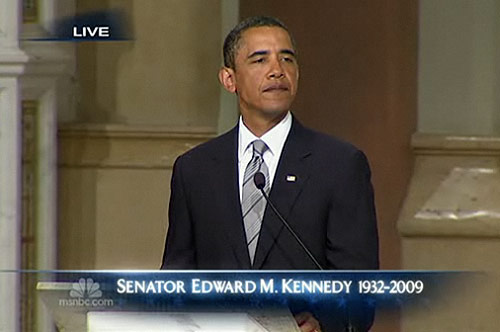
President Obama’s eulogy of Senator Ted Kennedy was personal and poignant. This mood was set forth from the start:
I, like so many others in the city where he worked for nearly half a century, knew him as a colleague, a mentor, and above all, a friend.
I expected a blend of personal remembrances of Kennedy and a passionate call to continue his work, but the president chose not to bring politics into his eulogy. He spoke of the man, not the politician:
We cannot know for certain how long we have here. We cannot foresee the trials or misfortunes that will test us along the way. We cannot know God’s plan for us.
What we can do is to live out our lives as best we can with purpose, and love, and joy. We can use each day to show those who are closest to us how much we care about them, and treat others with the kindness and respect that we wish for ourselves. We can learn from our mistakes and grow from our failures. And we can strive at all costs to make a better world, so that someday, if we are blessed with the chance to look back on our time here, we can know that we spent it well; that we made a difference; that our fleeting presence had a lasting impact on the lives of other human beings.
This is how Ted Kennedy lived. This is his legacy. He once said of his brother Bobby that he need not be idealized or enlarged in death because what he was in life, and I imagine he would say the same about himself. The greatest expectations were placed upon Ted Kennedy’s shoulders because of who he was, but he surpassed them all because of who he became. We do not weep for him today because of the prestige attached to his name or his office. We weep because we loved this kind and tender hero who persevered through pain and tragedy not for the sake of ambition or vanity; not for wealth or power; but only for the people and the country that he loved.
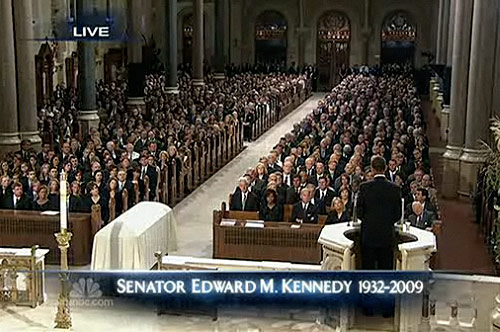
Tom Schaller at FiveThirtyEight.com wrote about the big names that were in the U.S. Senate when Senator Ted Kennedy began his career there:
Last night Ted Kennedy left the Senate for good as its liberal lion. But his point of arrival tells us a lot about him, too, for he was trained by, learned from and found great company among a group of pretty amazing senators in Washington when he arrived as a young cub on the scene almost 47 years ago.
I’m watching coverage of Senator Ted Kennedy’s funeral right now, and this image intrigued me:
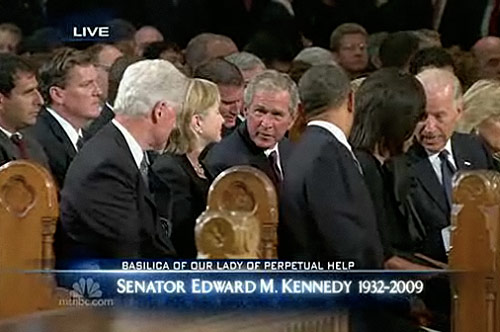
I don’t know the seating protocols (I’m sure they exist), but these four politicians sitting and talking together was striking to me. Just a year and some months ago, these politicians were at war with each other, yet here they are together today to honor the senator.
I wasn’t alive during the 1960s when the triumphs and tragedies of the Kennedy family sparked an indelible mark of magic and mystique for the Kennedys on the American psyche. Ted Kennedy was a link to that generation for my generation. His death is not just a death of a senator, but an end of an era.
http://www.youtube.com/watch?v=Z92VbdvSKSc2008 DNC convention tribute to Teddy:
Kennedy delivered the eulogy for his brother Bobby in 1968. His words could easily be applied to him: